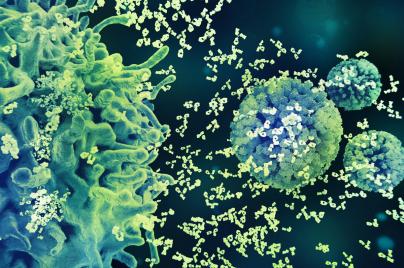Health protection through vaccination
Do you know diseases that vaccination can help to prevent? Here you can find out more.
30.10.2025

Vaccinations can protect us from disease by making our bodies immune in an intelligent way: they introduce substances into the body, such as a virus or bacterial component, that trick the immune system into thinking there is an infection. This prompts the body’s immune system to produce antibodies and activates an immune memory that can protect the body when it is confronted with the actual infection. This immunity can last for years, decades, or even a lifetime after vaccination.
The following overview shows some diseases and infections that vaccination can help to prevent (as of October 2025):
01.
Human papillomaviruses
Human papillomaviruses (HPV) are widespread. To date, more than 200 types of the virus are known. A distinction is made between high-risk and low-risk HPV types. The latter can cause genital warts in women and men. These are harmless but rather unsightly and annoying skin changes (nodules) in the genital area. The high-risk types can trigger forms of cancer in women and men, such as cervical cancer or vaginal, penile, anal, and throat cancers.
02.
Hepatitis B
Hepatitis B is an inflammation of the liver (jaundice), which is caused by the hepatitis B virus (HBV). The virus is transmitted via the blood or body fluids of an infected person (e.g. sexual intercourse). Hepatitis B is highly contagious. The infection is considered to be chronic if the virus is in the blood for longer than six months. WHO estimates that two billion people are infected by the hepatitis B (HBV) virus worldwide. 257 million of these are already chronically ill; over 880,000 people die every year as a result. In Switzerland, about 62,000 people live with hepatitis B.
03.
Pneumococcal Disease (PD)
PD is caused by a bacterium called Streptococcus pneumoniae, also known as pneumococcus. Pneumococcal diseases occur sporadically worldwide – outbreaks are rare. Several million people are affected each year and over one million of them die, many despite timely antibiotic treatment. The burden of disease is particularly high for infants under 2 years of age,among those aged 65 years and older and people of all ages with chronic conditions such as chronic heart disease or chronic respiratory disease. In Switzerland, there are about 1000 severe pneumococcal infections per year, mostly pneumonia, less frequently blood poisoning or meningitis. Children under two years of age and persons over 65 years of age are mainly affected. A total of around 100 people die each year, of whom around 80% are over 65 years of age.
04.
Chickenpox
Chickenpox is an infectious disease caused by the highly contagious varicella zoster virus (VZV). The virus causes a blister-like rash, itching, tiredness and fever. Chickenpox is most common in children but anyone who has not had chickenpox can get the disease.
05.
Measles
Measles is a highly contagious viral infection that can occur at any age. It begins with fever, fatigue, abdominal pain, photophobia, inflammation of the oral mucosa and is often accompanied by cough, colds and sore throat. Uncomplicated cases heal quite quickly and without permanent consequences. However, there is a risk of complications such as brain inflammation (encephalitis; 1 per 1000 cases), pneumonia (measles pneumonia; 10 to 60 per 1000 cases) or middle ear inflammation (otitis media). Sometimes measles complications lead to death.
06.
Mumps
Mumps is a contagious disease caused by a virus. It typically starts with headache, discomfort and fever, followed by the characteristic swelling of the parotid glands. Mumps is generally a mild children’s disease that mainly affects children between the ages of five and nine. However, adults can also become infected with mumps, which can be associated with serious complications.
07.
Rubella
Rubella is a contagious, generally mild viral infection that occurs most often in children and young adults. While the illness is generally mild in children, it has serious consequences in pregnant women causing fetal death or congenital defects known as congenital rubella syndrome (CRS). The rubella virus is transmitted by airborne droplets when infected people sneeze or cough. Humans are the only known host.
More information on protecting health through vaccinations: BAG Vaccinations & Prophylaxis
CH-NON-01256, 10/2025




